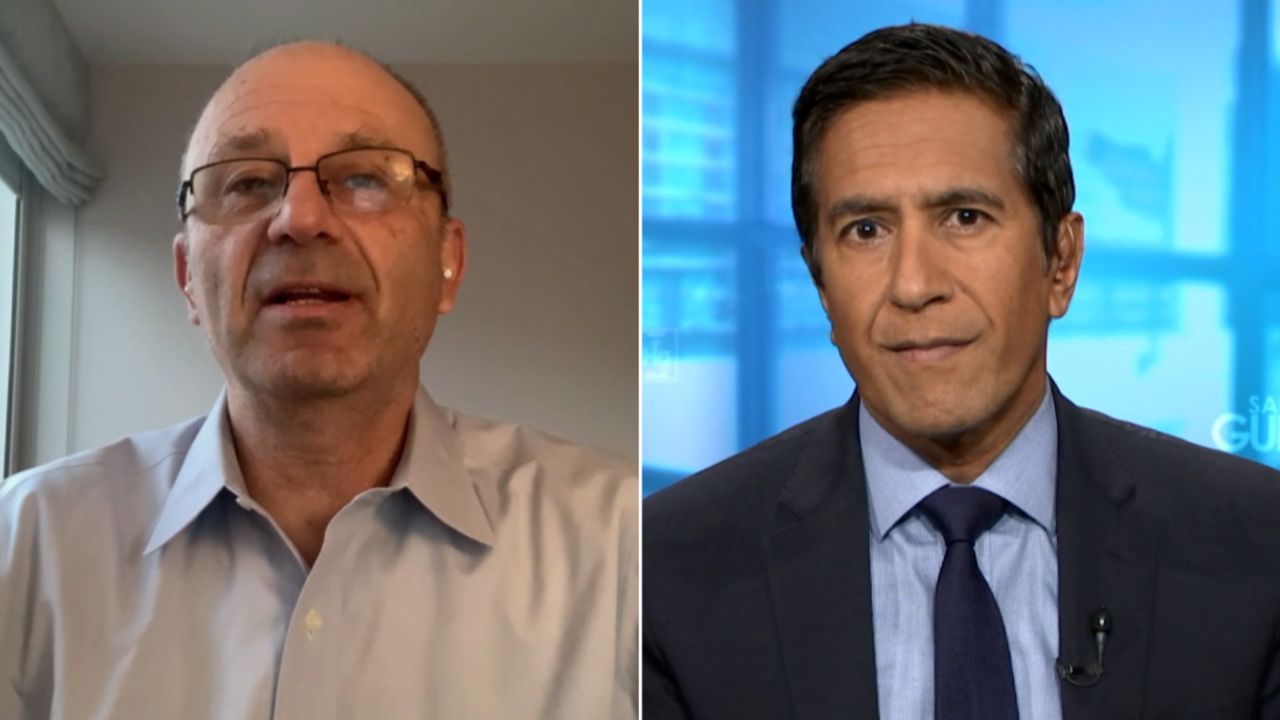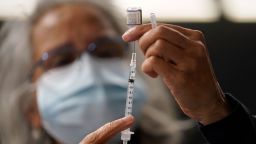Editor’s Note: A version of this story appeared in CNN’s Meanwhile in China newsletter, a three-times-a-week update exploring what you need to know about the country’s rise and how it impacts the world. Sign up here.
When the highly infectious Delta variant hit China in the summer, some public health experts were hopeful that the country could soon receive an immunity boost from BioNTech’s highly effective mRNA Covid-19 vaccine.
In July, the shot was reported to have passed an expert review by Chinese regulators and was in the administration review stage, according to Fosun Pharma, the Chinese partner of BioNTech licensed to produce and distribute the vaccine in the Greater China region. Fosun was even planning to start domestic trial production by the end of August.
However, five months later there is still no word from Chinese officials on when – or whether – the vaccine will ever be approved, even as the newly emerged Omicron variant is detected in China, posing a fresh challenge to the country’s zero-Covid strategy and its less effective domestic vaccines.
Health authorities in the northern port city of Tianjin have detected mainland China’s first case of the Omicron variant among inbound travelers who arrived from overseas on December 9, state media reported Monday.
Much remains unknown about the fast-spreading Omicron variant, which carries an unusually large amount of mutations that scientists worry could potentially make it more transmissible and less susceptible to existing vaccines.
Preliminary lab studies show two doses of the BioNTech vaccine, which is produced by Pfizer outside of China, may not provide sufficient protection against infection with Omicron, but three doses are able to neutralize it, Pfizer/BioNTech said in a news release last week. Two doses may still provide protection against severe disease, it added.
China has not released studies on how much its domestic vaccines protect against Omicron, though experts and state media have voiced confidence in curbing the new variant.
More than 1.1 billion Chinese people – or nearly 80% of the population – have been fully inoculated, mostly with inactivated vaccines developed by Sinopharm and Sinovac. But their efficacy was found to be much lower than the mRNA shots, and studies suggest the immunity provided by the Chinese vaccines wanes rapidly.
According to the World Health Organization, Sinovac’s vaccine CoronaVac was just 51% effective at preventing symptomatic disease against the original variant, while Sinopharm was 79%. In comparison, the efficacy of mRNA vaccines developed by Pfizer/BioNTech and Moderna were as high as 95%.
And a Hong Kong study published in The Lancet in June found that health workers fully vaccinated with BioNTech’s mRNA shot had about 10 times the amount of antibodies than those who received Sinovac’s inactivated vaccine.
The limited protection provided by Chinese vaccines is far from enough to satisfy China’s ambitious goal of keeping Covid infection at zero within its borders. Over the past few months, authorities have resorted to increasingly stringent measures to curb local outbreaks – often at great economic cost and disruption to daily lives.
But infections have continued to flare up. Last week, more than 130 cases were reported in eastern Zhejiang province, home to the country’s key manufacturing and export hubs. And several local authorities across China have called for residents not to travel home for the Lunar Chinese New Year to reduce the spread of the virus.
To improve waning public immunity, Chinese authorities have started rolling out booster shots – but again using the inactivated vaccines.
Some studies have found that mRNA vaccines can generate better immune responses as booster shots. A recent British study, for instance, found that mRNA vaccines made by Pfizer/BioNTech and Moderna provide the biggest boost to antibody levels when given 10-12 weeks after the second dose. Two separate studies from Israel published last week, meanwhile, showed booster doses of Pfizer/BioNTech’s vaccine reduced infections tenfold and Covid deaths by 90%.
It’s not that Chinese officials are unaware of the advantage of using mRNA vaccines. Last month, Zeng Guang, a former chief epidemiologist at the Chinese Center for Disease Control and Prevention, acknowledged that “real world data showed that using mRNA vaccines or recombinant protein vaccines as a booster dose for inactivated vaccines will achieve better results,” citing data from countries such as Turkey, Thailand and Lebanon.
But still, Zeng insisted that using the same technology to deliver booster shots would be safer and more widely accepted by the public.
So why is the Chinese government reluctant to approve Western mRNA vaccines?
Yanzhong Huang, a senior fellow for global health at the Council on Foreign Relations, said politics appears to be the main consideration at play.
China had been a frontrunner in the global vaccine race for much of last year, developing multiple Covid shots using the old-fashioned approach of employing an inactivated whole virus to prompt the body to develop immunity.
It has also sent billions of doses abroad – a campaign that provided vital access to vaccines in developing countries, while also serving to help Beijing promote soft power and project international influence.
“When China developed its own vaccines, they used that to show the technological progress of China. And now if you switch to a foreign-made vaccine, it’s tantamount to admitting that you’re not as good as other countries in terms of technological capabilities,” Huang said.
The Chinese government may also be keen to protect the interests of its domestic vaccine industry, according to Huang. “I’m sure they (existing vaccine makers) would be very resistant to introducing outsiders to this huge market,” he said.
While Chinese regulators held off approval for the BioNTech vaccine, domestic companies were given the green light to forge ahead with developing their own mRNA vaccines.
Last month, China’s Ministry of Science and Technology approved trials for a domestically developed mRNA vaccine as a booster shot – for adults who have been fully inoculated with inactivated vaccines. It has already conducted clinical trials in countries including Mexico and Indonesia, though the results have yet to be announced.
The vaccine, ARCoVax, was jointly developed by Walvax Biotechnology, Suzhou Abogen Biosciences and the Academy of Military Medical Sciences – a Chinese military research institute. Its production base in southwestern Yunnan province has the capacity to produce 200 million doses annually, according to state media reports, which touted China’s success in having “grasped core mRNA vaccine technology.”
Several other Chinese companies, including state-owned giant Sinopharm, are also developing mRNA vaccines, Huang said. Beijing will likely want to approve homegrown mRNA vaccines before greenlighting any foreign ones, he added.
But there are signs that Chinese experts are hoping for more cooperation with their Western counterparts.
Over the weekend, Zhong Nanshan, a top Chinese respiratory disease expert and government adviser, urged China to increase exchanges and cooperation in vaccine development with other countries.
“We need to learn about the good things in other countries, such as mRNA (vaccines),” Zhong said at a forum in the southern city of Guangzhou Saturday.
“They’ve spent years on the research and managed to develop the world’s first mRNA (vaccine) in just a few months…We need to learn from their technology in this area,” he said.























